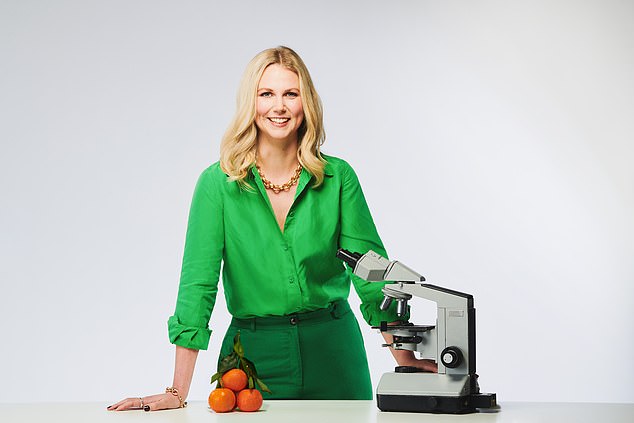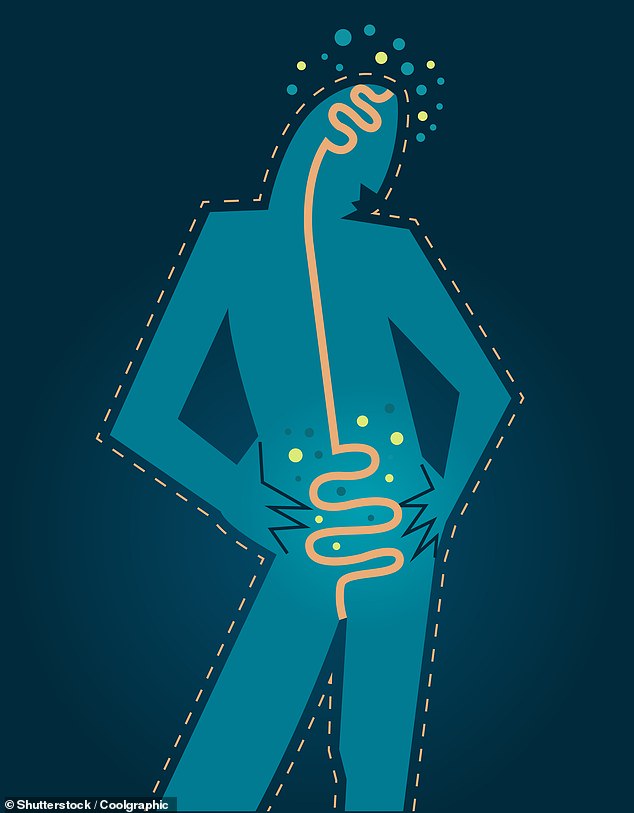Tired and depressed? The quiz that shows how healthy your gut really is: DR EMILY LEEMING
Tired and depressed? Bloated? Having trouble concentrating? These are signs that your gut is talking to your brain—and you need to listen.
As I explained in last week’s edition of Good Health, your gut, and specifically your gut microbiome (the community of bacteria, fungi, and microbes that live there), is critical to every aspect of your health, from your immune system to your likelihood of gaining weight.
And now we know that your gut microbiome is also critical to your brain health, influencing your mood and thinking skills.
For centuries, our medical system has separated the mind from the body. But while brain issues are still often treated separately from the rest of the body, there is now a growing understanding of how important the gut-brain connection is to both health and disease.
For example, 80 percent of people with Parkinson’s also suffer from constipation, a symptom that can occur up to 20 years before other warning signs. And a third of people with irritable bowel syndrome also suffer from depression and anxiety.
If your microbiome is unhealthy, chances are you’ll feel the same way – from feeling lethargic to depressed and often digestive issues
Your gut bacteria and your brain talk in many different ways. When your gut bacteria break down food, they produce metabolites: small molecules that play a crucial role in your health.
For example, short-chain fatty acids are a type of metabolite produced when gut bacteria ferment fiber. Apart from the few that remain in your gut, almost all short-chain fatty acids are absorbed into your bloodstream and travel throughout your body.
Powerful anti-inflammatory molecules, they can help combat excessive inflammation in the brain. Lower levels of short-chain fatty acids have been found in brain diseases such as Parkinson’s and in mouse studies of Alzheimer’s and chronic stress.
These metabolites have been linked to health benefits, including your mood and appetite.
Some bacteria produce metabolites that act as chemical messengers that send signals to the brain via the immune system and the vagus nerve — this extends from the brain to your gut, to the lining of your intestines, home to your gut microbiome. So how well is your gut-brain connection working?
If your microbiome is unhealthy, you’ll probably feel the same way — from lethargy to bad moods and often digestive issues. In addition to how you feel, there’s a free, easy way to track your gut health — and it’s by lifting the toilet lid.
There’s no need to be ashamed: the shape, color, and frequency of your stool are a good way to see if your gut and gut microbiome are healthy.
Let me explain. Your poop is about a quarter solid. Three quarters is water, which helps keep it nice and soft.

Dr Emily Leeming explained in last week’s Good Health that your gut microbiome – the community of bacteria, fungi and microbes – is key to every aspect of your health, from your immune defences to your likelihood of gaining weight.
The solid portion consists of: 25-50 percent intestinal bacteria (living and dead); undigested food remains such as protein, fiber, fat, and some carbohydrates; some of your dead body cells; and dried digestive juices.
If everything is working properly, chances are you will have a firm brown stool that passes easily. It will look like a smooth sausage or one with some cracks in it. A healthy stool usually sinks, although floating can sometimes be a sign of a high-fiber or high-fat diet. As for the color, healthy stool is brown, thanks to a pigment called stercobilin. Without this pigment, your stool would be a light beige.
To help you digest the fats in your food, your liver secretes bile into your small intestine: some of the bile breaks down into stercobilin, which turns everything brown as it mixes with your digesting food. When poop moves through your body too quickly, like when you have diarrhea, the bile doesn’t have time to break down into stercobilin, and your poop may look more yellow or green.
In addition to color, other signs of unhealthy gut flora include: a sudden change in how often you urinate that lasts more than three to four days; soft, loose stools or hard pellets; discomfort or pain when urinating; urinating even when you need to, the feeling that you can’t get all of your stool out, or it takes a long time before you have to urinate.
If your poop looks red or black and you haven’t just eaten some beetroot, it could be because there is some blood in it. This is a warning sign and you should seek medical advice.
Of course, there are also the obvious digestive symptoms that can reveal the state of your gut health. These include bloating. It’s a very common and normal reaction that most people experience from time to time, so it’s not necessarily something to worry about.

Your gut microbiome is also critical to your brain health, influencing your mood and how well you think.

Make half your plate fruits and vegetables for good gut health, advises Dr. Leeming
You may be more likely to feel bloated, for example after a large meal, when you’re feeling stressed or anxious, or just before your period (due to changing levels of estrogen and progesterone that cause smooth muscle to contract and shed the uterine lining. For some, this can slow down the digestive system, causing constipation and bloating, or speed it up, causing more frequent bowel movements).
Bloating can be a sign of a problem if it does not go away (in which case consult a doctor).
Another sign of healthy intestines is flatulence: when you eat or drink, you may swallow small amounts of air that collects in your intestines.
Once the gas is in your body, most of it has to escape somehow, such as through a burp or a fart.
The average person produces the equivalent of one to four large glasses of gas and farts between 12 and 25 times a day, usually in the hour after each meal.
You also fart when you sleep in bed because your anal sphincter relaxes, allowing gas to escape more easily. Farting is normal and is often a sign of a healthy digestive system, and specifically happy gut bacteria!
When you feed your friendly gut bacteria the food they love, they produce gas as a side effect. Think of it as a cat bringing you a dead mouse as a gift. Most farts don’t stink — but 1 percent do. Usually, this is because of the food you eat.
Sulfur, a compound found in foods such as meat, eggs, cauliflower and Brussels sprouts, is broken down by some gut bacteria into a gas, hydrogen sulfide, which smells like rotten eggs.
If you naturally have more of this type of gut bacteria, you will produce more of this smelly gas than anyone else. But if you are regularly throwing up big stink bombs, it could be a sign of an imbalanced gut flora. Armed with this information, take my gut health quiz now to see how you are doing.
The good news, as I mentioned last week, is that there are simple, scientifically proven ways to improve your gut health, make you feel happier and more energetic, and boost your brain.
Here’s a quick reminder of some of my tips for a good gut-brain diet (more information can be found in my new book):
- Eat more fiber.
- Make half your plate fruits and vegetables: They provide a double dose of fiber and polyphenols, antioxidants that act like rocket fuel for your gut bacteria.
- Have a regular bedtime routine.
- Get your hands dirty: A teaspoon of soil contains more microbes than there are people on Earth. A small study found that when people rubbed their hands in soil for 20 seconds three times a day (rinse only, no soap), their gut bacteria diversity increased in just two weeks.
- Eat oily fish twice a week.
- Drink a cup of coffee every day (if you don’t have a sensitive gut): Coffee drinkers often have a more diverse gut microbiome.
- Practice regularly.
Genius Gut by Dr Emily Leeming (Penguin, £18.99) is published on 25th July. © Emily Leeming 2024. To order a copy for £17.09 (offer valid until 21st July 2024; free UK delivery on orders over £25), visit mailshop.co.uk/books or call 020 3176 2937.
